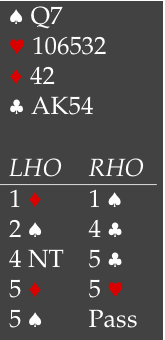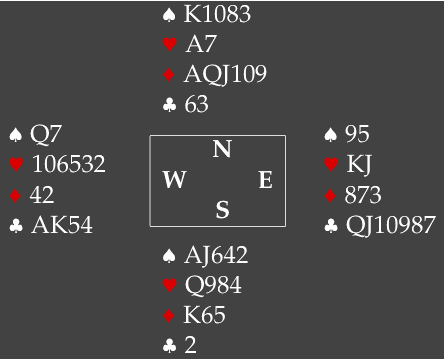 For years, the Bols liquor company sponsored a yearly event where experts could submit bridge tips and a prize was awarded to the best tip. I’m not sure anymore, but I’d guess that the prize were a couple of bottles of jenever, the best known product of the company. Jenever (also spelled as Genever, the proper pronounciation is halfway between a “J” and “G” sound) is a liquor distilled from grain alcohol.
For years, the Bols liquor company sponsored a yearly event where experts could submit bridge tips and a prize was awarded to the best tip. I’m not sure anymore, but I’d guess that the prize were a couple of bottles of jenever, the best known product of the company. Jenever (also spelled as Genever, the proper pronounciation is halfway between a “J” and “G” sound) is a liquor distilled from grain alcohol.
Now, I personally don’t care that much for jenever as most, including the product from Bols, is made by mixing industrial alcohol with artificial flavors, rather than the old process of distillation and slowly letting the product age. If you want to know the nasty details, click here for a documentary from the Dutch TV series “Keuringsdienst van Waarde”. A warning though, once you have seen the program, you probably don’t want to drink this again. I do make an exception for the product from Stokerij van Damme (literally, “van Damme Distillery”) though. This is one of the few Jenevers still made in the old fashioned way. It is located near Gent in Belgium, if you ever find yourself in the area, go there to taste it. They have a bed and breakfast there too, so you don’t have to worry about driving home if you like the stuff and taste more than the legal limit.
Enough for a free commercial. What does all this have to do with bridge? Well, earlier this week, another site started to recycle the tips and then I ran across the hand below. Time for a new bridge tip from my side.
 You pick up this hand, club game, not a particularly high level. You find yourself on lead after this auction, where you and your partner passed throughout. There were no alerts, but that is not required above 3NT. Time to ask a couple of questions before you lead, the opponents play a natural system so the first 3 bids are clear. The following conversation starts:
You pick up this hand, club game, not a particularly high level. You find yourself on lead after this auction, where you and your partner passed throughout. There were no alerts, but that is not required above 3NT. Time to ask a couple of questions before you lead, the opponents play a natural system so the first 3 bids are clear. The following conversation starts:
- You: “What does 4♣ show?”
- LHO: “It is a splinter”
- You: “And 4NT?”
- RHO: “Keycard Blackwood”
- You: “5♣?”
- LHO: “1 or 4”
- You: “What about 5♦?”
- RHO: “It asks for the trump queen”
- You can guess the answer to that one but you nevertheless ask “and the response?”
- LHO: “5♥ denies the ♠Q”
With all that information, you lead the ♣K, partner shows an even number and you switch to a heart. Declarer wins, plays the ♠K and finesses in spades. Down 1 as the full hand was:

Declarer calls the Director!
Declarer is quite clear: looking at his hand, my opponent can see that the response to 5♦ must deny the ♠Q. There is no point in asking what 5♥ shows then. By asking, he intentionally tried to mislead me, suggesting that he does not have the ♠Q.
You argue that once you start asking questions about the auction, stopping to ask for explanations after 5♦ essentially tells the opponent that you already know what the 5♥ bid shows. That can only be the case if you hold the ♠Q yourself. By not asking, he will automatically get the spades right, something he should have done anyway.
It doesn’t help, the TD throws law 73D2 at you: “A player may not attempt to mislead an opponent by means of a remark”. Not only is the score adjusted to 5♠, making, you also get an additional penalty for improper behavior. Law 75F allows the TD to do so.
Now, I disagree with the ruling. Law 73D2 deals with intentional attempts to mislead an opponent and it is not at all clear to me that this is intentional. The player on lead does not have to know what system the opponents are playing, when asking for for explanations it is unavoidable that one sometimes asks a question which strictly speaking is not necessary. If the opponent draws an interference from that, that is at his own risk. If I had been at the table, I’d not have adjusted and would certainly not have given an additional penalty.
On the other hand, in particular in a low level club game, where this hand originated, I can understand declarer’s point of view. Somebody asks the bloody obvious and gets away with coffee-housing him into a bad score.
Could all this be avoided. Yes, and this is where my tip comes in:
- When on lead, simply ask for an explanation about the entire auction, do not ask about specific bids.
And for the other side:
- When an opponent asks for an explanation after the auction, simply and voluntary explain all bids.
In this case, imagine that the conversation had gone:
- You: “please explain the auction”
- LHO: “First 3 bids are natural, 4♣ showed a club splinter, I asked for keycards, he showed 1 or 4 without the ♠Q”
Declarer still has to solve the spade problem, if he gets it wrong, you get to keep your good score. Bottles of Balegemsche Jenever can be sent to the usual address.
Note: this hand and blog were inspired by an article in Arbitrair, a newsletter for TD’s. Contact the editor to subscribe, it is free. While most free bridge lessons are highly overpriced, that is certainly not the case for this one, even though I disagree with the ruling the authors gave on this hand.
